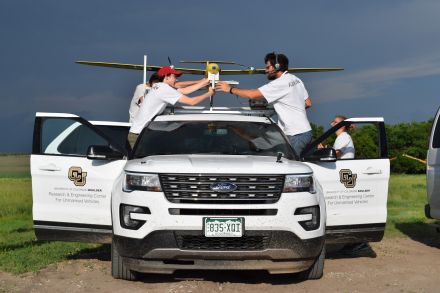Pioneering the future: Cultivating STEM leaders for climate action
The U.S. National Science Foundation is at the forefront of supporting research that explores the intricate connections between the complex relationships that humans have with oceans, land, atmosphere and climate, and the crucial impacts these relationships have on the planet's current and future well-being.
NSF funds research centered on a wide array of critical environmental studies — from understanding the immediate dynamics of daily weather occurrences to unraveling the long-term patterns of climate change. This pioneering research allows scientists to investigate the Earth's climate and geological events to forecast future environmental scenarios. Through the Innovations in Graduate Education (IGE) initiative, NSF supports groundbreaking projects across the United States that are preparing the next generation of scientists and engineers for work in environmental studies. These projects not only enhance STEM graduate education but also direct it towards solving real-world environmental issues. Learn more about IGE projects leading this charge below.
___________________
Field-Intensive Research Emphasizing Diversity UP in the alpine: University of Colorado at Boulder
Field-Intensive Research Emphasizing Diversity UP in the alpine (FIRED UP) is revolutionizing the traditional STEM education pathway by offering an immersive early field experience program. This initiative focuses on building a supportive community that values inclusivity and fostering collaboration to address large-scale environmental and climate issues. By integrating field research early into graduate STEM studies, FIRED UP equips students with the necessary tools to become leaders in environmental science, ready to tackle pressing climate crises with innovative solutions. Learn more about this program.
Stakeholder-Driven Sustainable Development: Penn State University Park
Understanding that effective climate action requires collaboration, this project focuses on stakeholder-driven approaches to sustainable development. By engaging directly with affected communities, students learn to apply their technical knowledge to enhance sustainability practices across various sectors. This hands-on experience is crucial for developing adaptable solutions that respect local needs and contribute to global environmental goals. Learn more about this program.
Semiconductors and Solar Energy: Arizona State University
Arizona State University focuses on breaking barriers to access in the critical fields of semiconductors and solar energy. This project enhances the capabilities of program graduates and prepares them to lead the transition to renewable energy technologies. By fostering a deeper understanding and involvement in solar technology, graduates are prepared to drive innovation in energy solutions, directly impacting efforts to combat climate change. Learn more about this program.
Transdisciplinary Research in Graduate Engineering: Texas A&M University, Kingsville
Recognizing the interdisciplinary nature of today's global challenges, this program at Texas A&M University, Kingsville, encourages transdisciplinary research among its graduates. This approach not only broadens student perspectives but also enhances their ability to innovate at the intersection of technology, environment and society. Such training is essential for developing sustainable solutions that address the complexity of climate change. Learn more about this program.
Advancing and Strengthening Science Identity through Systematic Training: The University of Texas at San Antonio
The Advancing and Strengthening Science Identity through Systematic Training (ASSIST) program focuses on advancing and strengthening science identity among program graduates. Through systematic training, this initiative empowers students to see themselves as integral contributors to the science community, with a particular focus on environmental issues. By building a strong science identity, graduates are more likely to persist in their careers and make significant contributions to climate science and policy. Learn more about this program.

